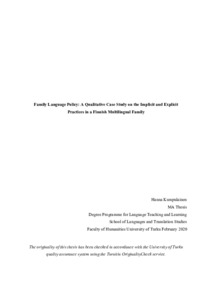Attitudes Toward Future Japanese Families among Japanese University Students : Tradition, Ideals and Stigmas
Heikkinen, Milla (2019-05-16)
Attitudes Toward Future Japanese Families among Japanese University Students : Tradition, Ideals and Stigmas
Heikkinen, Milla
(16.05.2019)
Julkaisu on tekijänoikeussäännösten alainen. Teosta voi lukea ja tulostaa henkilökohtaista käyttöä varten. Käyttö kaupallisiin tarkoituksiin on kielletty.
avoin
Julkaisun pysyvä osoite on:
https://urn.fi/URN:NBN:fi-fe2019060719553
https://urn.fi/URN:NBN:fi-fe2019060719553
Tiivistelmä
This MA thesis studies the attitudes of university students toward family ideals during the heightened demographic issues present in society in 21st century Japan. The ie ideology, the traditional conceptualization of family with a patriarchal head of house and dutiful wife who cares for the children and husband’s parents in one household, has created remnants that have furthered already present stigmatizations of nontraditional family formats, heightening the need for further research as family ideals are rapidly changing. This research study sets out to explore the attitudes of university students who have the potential to be the future generation of parents, to gather information on family-related ideals as a way to formulate a comprehension of the changing family ideals that are in part causing the demographic crisis.
Through the use of qualitative research methods, the research results indicate that there is not just one culprit towards declining birthrates, but that there are several in that the changing family ideals have created multiple ideal families as suggested by university students. These ideals include, but are not limited to, multigenerational households, nuclear households, and single person households, with or without marriage and children, clearly distinguished from previous generations. Family has also begun to incorporate non-blood related individuals into the embodiment of family, completely changing the traditional concept for family as mandated by ie ideology. With the inclusion of more individualistic tendencies that are subsequently delaying marriage and children until later, perhaps even indefinitely, as Japanese youth are dedicating more effort towards education, careers and individual indulgences. These changing perspectives on family have created attitudes that are normalized to have few to no children, due to the presence of nontraditional family tendencies visible within society, thus, then creating divergent attitudes for family formation.
These results incorporate the understanding of family from the perspectives of university students to better understand the fertility crisis, not from an economic perspective, but rather from a social science and sociology perspective. The inclusion of young adult ideals and views helps to further the research on the fertility issue, whilst also providing insight into the changing concept of family in the Japanese context.
Through the use of qualitative research methods, the research results indicate that there is not just one culprit towards declining birthrates, but that there are several in that the changing family ideals have created multiple ideal families as suggested by university students. These ideals include, but are not limited to, multigenerational households, nuclear households, and single person households, with or without marriage and children, clearly distinguished from previous generations. Family has also begun to incorporate non-blood related individuals into the embodiment of family, completely changing the traditional concept for family as mandated by ie ideology. With the inclusion of more individualistic tendencies that are subsequently delaying marriage and children until later, perhaps even indefinitely, as Japanese youth are dedicating more effort towards education, careers and individual indulgences. These changing perspectives on family have created attitudes that are normalized to have few to no children, due to the presence of nontraditional family tendencies visible within society, thus, then creating divergent attitudes for family formation.
These results incorporate the understanding of family from the perspectives of university students to better understand the fertility crisis, not from an economic perspective, but rather from a social science and sociology perspective. The inclusion of young adult ideals and views helps to further the research on the fertility issue, whilst also providing insight into the changing concept of family in the Japanese context.
Samankaltainen aineisto
Näytetään aineisto, joilla on samankaltaisia nimekkeitä, tekijöitä tai asiasanoja.
-
Family Language Policy: A Qualitative Case Study on the Implicit and Explicit Practices in a Finnish Multilingual Family
Kumpulainen, Hanna (24.02.2020)The present study is a qualitative case study on a Finnish multilingual family’s implicit and explicit family language policy, and the factors that have affected its formation. The purpose of the study is to shed light on ...avoin -
What is a child? : A comparative study on understanding the definition of a child when considering the child’s best interests principle in European family law and Islamic family law
Kalaja, Laura (02.06.2024)This thesis seeks to enrich our knowledge on how the definition of a child is understood in European family law and Islamic family law. It also perceives the influence of this conception when considering the child’s best ...suljettu -
All in the family – The role of socioemotional wealth in internationalization of small- and medium-sized family firms
Liljeroos, Lotta (28.06.2023)While family firms (FF) form a crucial part of activity for any markets, there are ambiguous views related to inherent constraints of these firms and this study analyses the social motives, especially socioemotional wealth ...suljettu

